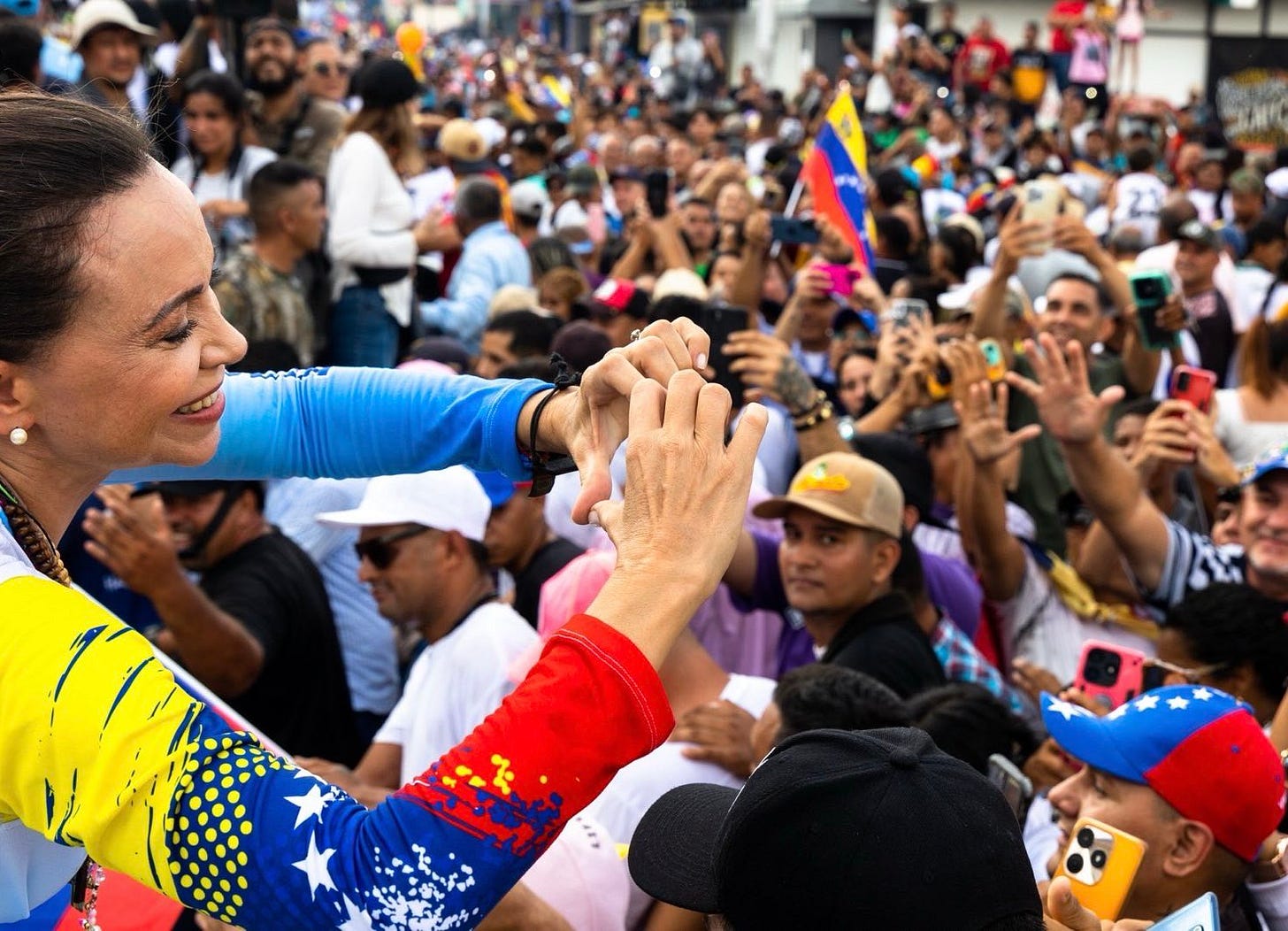Venezuelan opposition leaders defend attacks against their own diaspora
MCM echoes Trump rhetoric on Tren de Aragua, claims migrants are "destabilizing" the Americas, continues silence on CECOT
This is our “LATAM Wires” daily newsletter, freshly launched. Signing up will get you flash updates on breaking stories and snapshots of development on big headlines. And it’s free! We chose not to automatically enroll the thousands of subscribers from our PWS features newsletter, so if you’re already reading us there, and this interests you, sign up!

Opposition leaders in Venezuela have long tried to maintain positive relations with members of the Trump administration and other right-wing leaders in the Americas.
Recent international controversy over the more than 200 Venezuelan migrants detained at the infamous CECOT prison facility in El Salvador, however. has brought another long-simmering issue into the spotlight — in the face of policies that hurt the more than 8 million members of the Venezuelan diaspora abroad, opposition leaders are increasingly prioritizing politics over the Venezuelans they claim to represent.
Opposition leader María Corina Machado, who has long made false claims that Venezuelan migrants “destabilize” the countries they have fled to across the Americas, has been publicly silent about the fate of Venezuelans held there, more than 90% of whom have been charged with no crime.
The Trump administration has claimed publicly that the men are members of the “Tren de Aragua”, a Venezuelan gang that has gained notoriety in recent years across the continent. The U.S. has offered little to no evidence of the accusations beyond the word of individual ICE officers.
Statements by ICE in court documents as part of an ongoing legal battle over the deportation flights have contradicted many administration’s own claims about the detainees.
Nonetheless, Venezuelan opposition members in the U.S, El Salvador, and within Venezuela have been largely silent on the CECOT prisoners, as well as broader Trump administration efforts to remove Venezuelan migrants from the U.S.
Machado has long publicly supported the legal rationale the Trump administration uses to defend the mass deportations of Venezuelan migrants currently in the U.S. as part of her claims that Venezuelan President Nicolas Maduro is the functional head of the Tren de Aragua — a claim for which there is no evidence.
The Trump administration on March 15 invoked the 1798 Alien Enemies Act for the fourth time in U.S. history. Trump’s team claims the order justifies the deportation of Venezuelan migrants to El Salvador due to the U.S. suffering a supposed “predatory incursion” from the Venezuelan government in league with the Tren de Aragua.
Two days later, the first U.S. flight to CECOT arrived in El Salvador. The same day, Machado published a written statement reiterating her claims that criminals among the diaspora are agents for the Tren de Aragua and controlled by the Maduro government.
Although the message contained a request “to distinguish between criminals employed by the Maduro regime” and innocent migrants, to avoid “the unjust criminalization of Venezuelan migrants”, it did not mention the more than 200 men being held at CECOT directly.
Statements from Venezuelan opposition members in El Salvador have been equally guarded. Bukele has long employed former Venezuelan opposition lawmakers as advisors. The group, sometimes called Bukele’s “shadow cabinet,” reportedly enjoys considerable influence on his decision-making. One of the advisors, Sara Hanna Georges, is a former member of Leopoldo López's right-wing party “Popular Will” (Voluntad Popular).
Maduro conveniently exploits the fact, and has accused both Machado and López of supporting the deportations. “Who went out to support the kidnapping of these Venezuelans in El Salvador?” said Maduro recently in his state TV program, referring to a Bukele visit to the White House that was attended by Georges and other Venezuelan “shadow cabinet” members.
Further complicating matters for Machado and other opposition members, the U.S. has announced plans to end Temporary Protected Status (TPS) for Venezuelans in the country. The decision is currently paused after an injunction by a California federal judge, but the Trump administration has appealed.
Secretary of State Marco Rubio, a longtime ally of Machado, backs the measure to end TPS for Venezuelans, a measure that would affect hundreds of thousands of migrants currently in the U.S. He has also released a series of misleading statements about the Venezuelans currently held at CECOT, staunchly defending their imprisonment.
On April 16, Machado wrote a highly complimentary statement to Rubio, thanking him for his recent comments about her for a TIME magazine article. “Every word you wrote is an honor I receive with deep gratitude and emotion,” she said. “They are a tribute to the millions of Venezuelan men and women who have fought — often in silence, always with courage — for dignity, liberty, and justice.”
She again made no mention of CECOT or TPS programs.
In a recent interview with Venezuelan journalist Carla Angola, Machado claimed she is doing everything in her power to help Venezuelans in the United States. “I know there is enormous anguish over the decisions President Trump's administration has made to combat illegal immigration,” Machado said. "To all Venezuelans I want to assure them: everything that could have been done…has been done. We do it, of course, with discretion, without trying to turn this into a domestic political issue."
A recent offer by the Salvadoran President to swap the Venezuelans held at CECOT for political prisoners in Venezuela, including Machado’s mother, has further complicated an already thorny political situation.
MCM has been silent on the issue, but some analysts in Venezuela sympathetic to the opposition have opposed the move. Luis Carlos Díaz, a journalist and political personality in Caracas, yesterday criticized the potential swap, stating “Venezuelan prisoners in El Salvador and Venezuela are not equivalent. They should not be interchangeable.”
After some dancing around the issue, he seemed to advocate that both groups remain imprisoned, despite widespread human rights violations against both groups in both countries.
It seems clear that when faced with a choice between supporting Venezuelan migrants and personal political gain, Machado and other politicians have chosen the latter, to the great loss and substantial personal risk to the more than 8 million who have fled the country.





